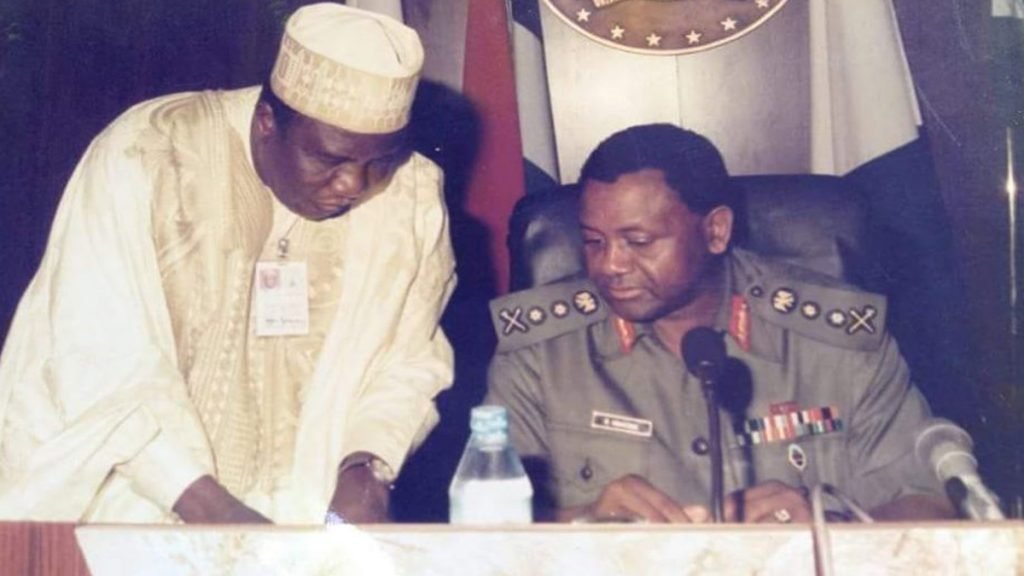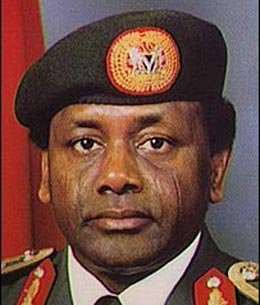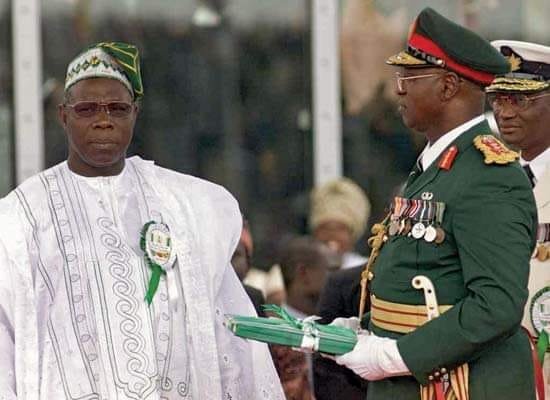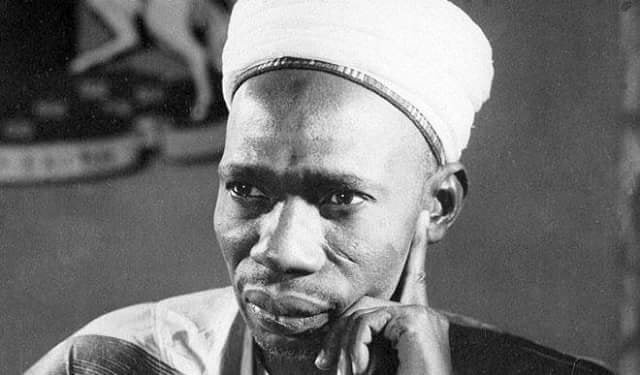No products in the cart.

General Sani Abacha, Nigeria’s seventh military head of state from 1993 to 1998, is remembered as one of the most infamous leaders in the country’s history. His rule, marked by authoritarianism and corruption, left a deep scar on Nigeria’s political landscape, with repercussions that are still felt today.
While some recall him as a patriotic leader who championed Nigeria’s economic interests, his legacy is overwhelmingly defined by human rights abuses, looting of public funds, and the iron grip he maintained on the nation.
Contents
Early Life and Rise to Power
Born in Kano in 1943 to a prosperous family, Abacha did not come from the poverty-stricken backgrounds of many other military leaders. His father owned a successful transport business, and the family was well-established in Kano. After joining the Nigerian Army, Abacha quickly rose through the ranks, participating in several coups that shaped the political landscape of the country.

General Abacha seized power on November 17, 1993, in a palace coup that deposed the interim national government of Chief Ernest Shonekan, a civilian administrator who had been appointed to oversee the transition to democracy 82 days before. Abacha’s ascension to power marked the beginning of one of the most repressive regimes in Nigerian history. His leadership was defined by the ruthless elimination of political opposition and widespread fear.
A Reign of Terror
Under Abacha’s rule, Nigeria became synonymous with state-sponsored repression. His regime imprisoned, exiled, or executed critics and opposition figures. The most high-profile case was the execution of Ken Saro-Wiwa, a writer and environmental activist, and eight others from the Ogoni community on November 10, 1995. Their deaths, which came after a flawed trial, drew international condemnation and cemented Abacha’s reputation as a brutal dictator. Time Magazine named him “Thug of the Year” in 1995, a reflection of how the world viewed his regime.
Abacha’s secret police, under the leadership of Major Hamza al-Mustapha, ruthlessly silenced opposition to his regime. Journalists, pro-democracy activists, and political figures were either jailed or forced into exile. His regime became known for its clandestine executions and mysterious disappearances of critics.
Abacha’s corruption was deeply rooted in a combination of personal greed, a lack of accountability, the corrupt culture of Nigeria’s military and political elite at the time…
Abacha feared no one and no one was above him. He deposed the Sultan of Sokoto and jailed the former Head of State, Olusegun Obasanjo and his deputy, Shehu Musa Yar’Adua for treason on trumped-up charges. The latter did not survive the Abacha gulag. Yar’Adua later died in prison in December 1997.
Even General Ibrahim Babangida, who had stepped aside for Abacha to stylishly take over, was silent throughout the general’s four-and-a-half years brutal reign.
Why Abacha was so corrupt
If brutality was the hallmark of Abacha’s reign, his staggering corruption set a new low in Nigeria’s governance. Abacha is ranked among the most corrupt leaders in modern history. During his nearly five years in power, it is estimated that he embezzled between $3 billion and $5 billion from Nigeria’s treasury. These funds were stashed in foreign bank accounts across Europe and other parts of the world. The Nigerian government continues to recover some of the stolen wealth to this day.
Despite Nigeria being a major oil producer, under Abacha’s rule, the country became dependent on importing refined petroleum products. The nation’s refineries fell into disrepair, a symbol of the mismanagement and neglect that defined his regime. Abacha’s embezzlement of public funds significantly contributed to the underdevelopment of key sectors in Nigeria, including healthcare, education, and infrastructure, exacerbating poverty and inequality.
Sani Abacha’s corruption was deeply rooted in a combination of personal greed, a lack of accountability, the corrupt culture of Nigeria’s military and political elite at the time, and the unchecked power that came with his position as a military dictator.
Corruption within the Nigerian military elite had already been entrenched by the time Abacha assumed power, and he merely expanded on a system that had long been plagued by misuse of public resources for personal gain.
As Nigeria’s head of state, Abacha ruled with absolute authority, and there were no effective mechanisms or checks and balances to hold him accountable. His regime operated under a military dictatorship, where all branches of government submitted to his will, and dissent was ruthlessly crushed. Abacha controlled all arms of governance, and there was no independent judiciary, free press, or opposition party strong enough to challenge his decisions or expose his corruption.

This atmosphere of unchecked power created a culture where corruption could thrive, as there was no oversight or legal consequence for Abacha’s actions. In environments where leaders are not held accountable, corruption often becomes rampant, and Abacha took full advantage of this.
His actions were driven by personal greed and the desire for immense wealth and power. His looting of the treasury, estimated to be between $3 billion and $5 billion, was far beyond what might be considered mere opportunistic corruption. He saw the state’s resources as his to control and plunder, and he pursued this with a single-minded determination to accumulate wealth.
His greed extended to stashing money in secret offshore accounts and investing in foreign assets. Abacha’s looting was not driven by ideology or policy but by a deep-seated desire for material wealth and the prestige that came with it. His rise to power came in an era when Nigeria’s military was deeply involved in politics, often through coups and authoritarian rule. Corruption within the Nigerian military elite had already been entrenched by the time Abacha assumed power, and he merely expanded on a system that had long been plagued by misuse of public resources for personal gain.
Throughout the 1980s and early 1990s, Nigeria’s political landscape was shaped by military dictatorships, during which public resources were frequently mismanaged, and state assets were sold off or privatised for the benefit of those in power. Abacha, having participated in several coups and worked closely with previous leaders like General Ibrahim Babangida, was part of this corrupt political and military network. The lack of institutional checks and the legacy of previous corrupt regimes allowed him to feel entitled to engage in massive financial crimes.
Nigeria’s weak institutions during Abacha’s rule also enabled his corruption. The country lacked strong anti-corruption bodies, and those that did exist were either underfunded or operated under the influence of the ruling government. There were no independent agencies that could investigate or prosecute high-ranking officials, and any opposition to Abacha’s actions was silenced through intimidation, imprisonment, or death.
Even the public sector was riddled with inefficiency and corruption, making it easy for Abacha and his associates to embezzle funds without triggering alarms. Poor governance and an ineffective civil service meant that billions could be stolen without immediate detection.
Since Abacha’s death in 1998, successive Nigerian governments have been working to recover the stolen funds.
Abacha’s ability to hide vast sums of money in offshore accounts across Europe and the United States also speaks to the role that global financial institutions played in facilitating his corruption. Countries such as Switzerland, Jersey, and Liechtenstein were known for their banking secrecy laws, which allowed dictators like Abacha to safely stash their wealth in anonymous accounts without fear of being exposed.
Abacha exploited this system, and it was not until after his death that the full extent of his international financial manoeuvres became apparent. The complicity of global financial systems in enabling money laundering and the illicit transfer of wealth provided fertile ground for corrupt leaders like Abacha to funnel money out of Nigeria.
General Sani Abacha operated in a climate of impunity, where corrupt practices were not only tolerated but expected among the ruling elite. The fact that previous military rulers, including those who looted the treasury, had escaped without serious consequences encouraged him to believe he could do the same. Corruption had become so embedded in the political system that there was little moral or social pressure to govern with integrity. For Abacha, looting the national treasury was part of the spoils of power, and he felt untouchable given his position as the ultimate authority in Nigeria.
The Abacha Loot
Abacha’s economic legacy is paradoxical. Despite his corruption, Nigeria’s foreign reserves increased from $494 million in 1993 to $9.6 billion by 1997, and the external debt was reduced from $36 billion to $27 billion in the same period. His administration halted the controversial privatisation programs of the previous Babangida regime, and inflation was brought down from 54% to 8.5%.

Abacha’s government also produced Vision 2010, a comprehensive development blueprint aimed at transforming Nigeria’s economy and governance. However, these achievements are overshadowed by the regime’s brutal repression and the looting of public funds that left the country economically crippled.
The vast amounts of money embezzled by General Sani Abacha during his time as Nigeria’s head of state have been the subject of intense international recovery efforts for decades. It is estimated that Abacha siphoned off between $3 billion and $5 billion into foreign bank accounts. The Nigerian government, alongside various international organizations and countries, has been working to recover these funds, often referred to as the “Abacha loot.” This monumental corruption has left a lasting impact on Nigeria’s economy, contributing to underdevelopment and deepening poverty.
Since Abacha’s death in 1998, successive Nigerian governments have been working to recover the stolen funds. Much of the loot was hidden in offshore accounts, with significant amounts stashed in countries like Switzerland, the United Kingdom, the United States, and various British dependencies such as Jersey.
Switzerland has been a major focus of recovery efforts. Over the years, Swiss authorities have returned more than $1 billion of the Abacha loot to Nigeria, beginning in 2005. The repatriation was conditional, requiring the funds to be used for development projects, primarily targeting poverty alleviation and infrastructure improvement.
As of 2024, the Nigerian government is still in the process of recovering more of the Abacha loot. Some funds remain frozen or tied up in legal disputes in foreign jurisdictions. However, billions of dollars have been successfully repatriated but Nigerians are yet to see its effect.
In the United States, authorities have also played a pivotal role in the recovery process. In 2020, the U.S. Department of Justice agreed to repatriate $311 million to Nigeria. This amount was recovered from accounts held in Jersey, a British Crown dependency, as part of a broader international effort to recover funds embezzled by Abacha.
The United Kingdom and its territories have been another source of hidden wealth. For instance, Jersey has returned over $268 million in separate instalments, recovered after lengthy legal processes. Though a significant portion has been identified, some funds are still tied up in legal battles or hidden in complex financial arrangements. While large sums have been recovered, billions are still believed to be hidden in secret accounts or locked in assets such as property and bonds, making their full recovery a prolonged and challenging process.
Since the end of Abacha’s unfortunate rule, successive administrations in Nigeria have been actively involved in tracing and recovering the stolen funds. Presidents such as Olusegun Obasanjo, Goodluck Jonathan, and Muhammadu Buhari have each played a role in pushing for the return of the stolen assets. These governments have also worked to ensure the recovered funds are used for social welfare and development projects, such as the National Social Safety Nets Project (NASSP), aimed at reducing poverty in Nigeria.
The World Bank has often overseen how recovered funds are utilised to ensure transparency and accountability. In many cases, the repatriation of funds comes with conditions attached, such as directing the money to specific projects aimed at benefiting the Nigerian populace.
The Nigerian Economic and Financial Crimes Commission (EFCC) has been the primary domestic agency spearheading efforts to track down and repatriate the Abacha loot. In cooperation with international law enforcement bodies like the U.S. Department of Justice and Interpol, the EFCC has played a pivotal role in navigating the complex legal battles surrounding these funds.
As of 2024, the Nigerian government is still in the process of recovering more of the Abacha loot. Some funds remain frozen or tied up in legal disputes in foreign jurisdictions. However, billions of dollars have been successfully repatriated but Nigerians are yet to see its effect. The question is, “Are the so-called Abacha loot being looted again?” Because much of it is supposed to be directed towards poverty reduction, healthcare improvements, infrastructure development, and other social programmes. Nevertheless, efforts continue, and international cooperation remains key to ensuring that the remaining hidden funds are traced and returned to Nigeria. However, the government must be accountable as to how these funds are spent.
Despite the partial success in recovering the stolen money, the legacy of Abacha’s looting continues to weigh heavily on Nigeria, highlighting the long-term damage corruption can inflict on a nation’s development.
Death and Aftermath
On June 8, 1998, General Sani Abacha died suddenly in Abuja, fueling widespread speculation about the cause of his death. Official reports stated that he suffered a heart attack, but rumours persisted that he was poisoned, possibly by political rivals or foreign agents. His death was met with celebration across Nigeria, as people took to the streets to mark the end of his brutal rule.

In the aftermath of his death, Major-General Abdulsalami Abubakar took power and swiftly initiated a transition to civilian rule. This led to the election and swearing-in of Olusegun Obasanjo, marking the end of military dictatorship in Nigeria and the start of the Fourth Republic, on May 29, 1999.
Abacha’s Legacy Today
Today, Sani Abacha remains a deeply controversial figure. In 2014, President Goodluck Jonathan controversially awarded Abacha a posthumous Centenary Award for his contributions to Nigeria’s economic development, sparking public outrage. For many Nigerians, Abacha’s name is synonymous with oppression, corruption, and economic sabotage.

His legacy continues to cast a long shadow over Nigerian politics, with corruption and military interference in governance remaining key issues. Even as the country transitions towards democratic stability, the damage inflicted by the Abacha regime, in terms of both human rights abuses and economic mismanagement, still reverberates across Nigeria’s political scene.
In summary, General Sani Abacha’s reign was one of the darkest periods in Nigerian history. His regime was defined by unchecked corruption, state-sponsored violence, and human rights violations. The millions he looted from the nation have left an indelible mark on Nigeria’s development, while his authoritarian rule serves as a cautionary tale for future leaders.
Please stay connected with us through our social media handles and make sure you are subscribed to our YouTube Channel. Together, let’s keep the stories of Nigeria’s past alive.
Leave a Reply
You must be logged in to post a comment.









Leave a Reply
View Comments